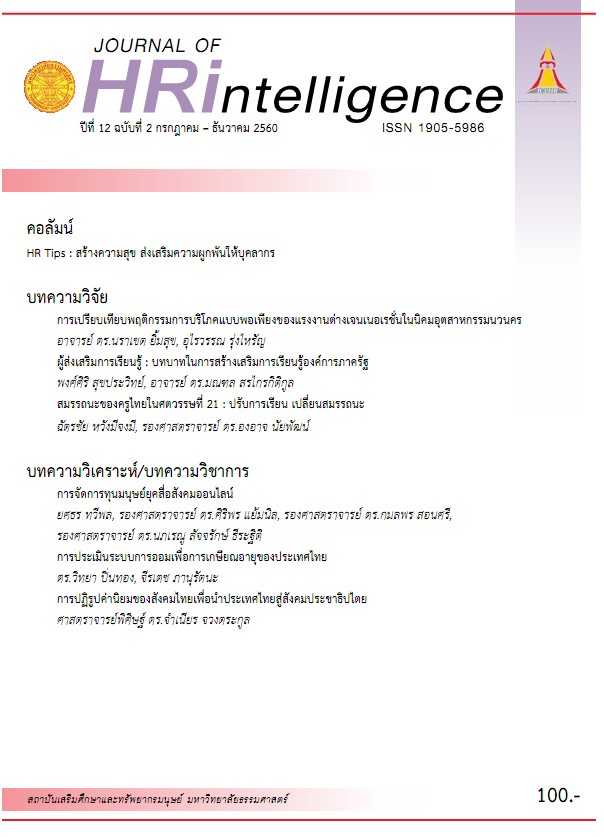The Learning Organization Agent: Roles of Facilitating Learning in a State-Enterprise Organization
Main Article Content
Abstract
This research aims to study the perception toward roles of the Learning Organization Agents (LO Agent) in a State-Enterprise organization which involving in the learning activities. A qualitative research method was employed. Data was collected from an in-depth interview with ten LO Agents. A secondary data such as internal announcements, standard operating procedures and reports in an organization were also analyzed to verify and support the finding.
The finding shows that the facilitator performs eight roles, which are Coordinator, Stimulator, Communicator, Learning Guidance, Volunteer, Monitoring, Compromiser, and Observer. By the way, the LO Agent performs six roles. The four roles are considered as group facilitation including Coordinator, Stimulator, Communicator, and Learning Guidance. In a State-Enterprise Organization, the results reveal two additional roles including Volunteer, and Monitoring. As LO Agent in this sample organization is considered as a supporting position, so volunteer roles are emerged. In the realm of bureaucracy procedure, updating and reporting to supervisor are regular process, so monitoring role are needed.
Article Details
ขอมอบลิขสิทธิ์บทความที่ได้รับการตีพิมพ์ให้แก่สถาบันเสริมศึกษาและทรัพยากรมนุษย์ กรณีมีการฟ้องร้องเรื่องการละเมิดลิขสิทธิ์เกี่ยวกับภาพ กราฟ ข้อความส่วนใดส่วนหนึ่ง และ/หรือข้อคิดเห็นที่ปรากฎในบทความ ให้เป็นความรับผิดชอบของข้าพเจ้าและผู้เขียนร่วมแต่เพียงผู้เดียว
References
วัฒนธรรม. (2551). คู่มือวิทยากรกระบวนการ ค่านิยมที่พึงประสงค์ สำหรับชุมชน/หมู่บ้าน. กรุงเทพฯ : โรงพิมพ์ชุมนุม
สหกรณ์การเกษตรแห่งประเทศไทย จำกัด.
คณะกรรมการนโยบายรัฐวิสาหกิจ, สำนักงาน. ระบบประเมินคุณภาพรัฐวิสาหกิจ (เกณฑ์วิธีการประเมิน). สืบค้นจาก http://
www.sepo.go.th/tinymce/plugins/filemanager/thumbs/SEPA/เอกสารเผยแพร่/1.pdf
คณะกรรมการพัฒนาระบบราชการ, สำนักงาน. เกณฑ์คุณภาพการบริหารจัดการภาครัฐ พ.ศ. 2558. สืบค้นจาก http://www.
opdc.go.th/uploads/files/2557/2.1.pdf
ทวีศักดิ์ นพเกสร. (2545). วิทยากรกระบวนการ : พัฒนาสุขภาวะชุมชน. เชียงใหม่ : วนิตาการพิมพ์.
ไพบูลย์ ช่างเรียน. (2516). สารานุกรมศัพท์ทางสังคมวิทยา. กรุงเทพฯ : แพร่วิทยา.
มงคลชัย วิริยะพินิจ และ พสุ เดชะรินทร์ (2551). Transforming the Organizations in Thai Public Sector into Learning
Organizations : An Explanatory Case Study Research. จุฬาลงกรณ์ธุรกิจปริทัศน์, 117-118, 58 - 72. (in Thai)
ระบิล พ้นภัย, วิโรจน์ เจษฎาลักษณ์ และ จันทนา แสนสุข (2559). ความสามารถในการแบ่งปันความรู้และผลการดำเนินงาน
ของธนาคารพาณิชย์ไทย. จุฬาลงกรณ์ธุรกิจปริทัศน์, 147, 25 - 63.
วีระชัย คล้ายทอง. (2550). รัฐธรรมนูญแห่งราชอาณาจักรไทย พุทธศักราช 2550. กรุงเทพมหานคร : ก. พล (1996).
สถาบันพัฒนาข้าราชการพลเรือน สำนักงาน ก.พ. (2545). การพัฒนาโดยการเรียนรู้จากการปฏิบัติ. กรุงเทพฯ : ห้างหุ้นส่วน
จำกัด สำนักพิมพ์ฟิสิกส์เซ็นเตอร์
สุภางค์ จันทวานิช. (2553). วิธีการวิจัยเชิงคุณภาพ. กรุงเทพฯ : สำนักพิมพ์แห่งจุฬาลงกรณ์มหาวิทยาลัย.
Biddle, B.J. (1986). Recent Development in Role Theory. Annual Review of Sociology, 12, 67-92
Braun, V & Clake, V. (2006). Using Thematic Analysis in Psychology. Qualitative Research in Psychology 2016, 3,
77-101.
Broom, L, and Selnick, P. (1977). Sociology. NewYork : Harper & Row, 34 - 35.
CANIA, L. (2014). The Impact of Strategic Human Resource Management on Organizational Performance. Economia
Seria Management, 17 (2), 373-383.
Cohen, B J. (1979). Introduction to Sociology. New York : McGraw-Hill.
Farazmand, A. (1999). Globalization and Public Administration. Public Administration Review, 59 (6), 509-522.
Farazmand, A. (2015). Governance in the Age of Globalization : Challenges and Opportunities for South and
Southeast Asia. Springer International Publishing Switzerland, (11) DOI 10.1007/978-3-319-15218-9_2
Garavan, T.N. (1997). Training, development, education and learning : different or the same?, Journal of European
Industrial Training, 21 (2), 39-50.
Gordon, A. (1937). Personality : A psychological interpretation. New York : Holt, Rinehart, & Winston.
Green, B. C., & Chalip, L. (2004). Paths to volunteer commitment : Lessons from the Sydney Olympic Games.
Volunteering as leisure/leisure as volunteering : An international assessment, 49-67.
Haivas, S., Hofmans, J., & Pepermans, R. (2013). Volunteer engagement and intention to quit from a self-determination
theory perspective. Journal of Applied Social Psychology, 43 (9), 1869-1880.
Lombardo, M.M., and Eichinger, R.W., (2001). High Potentials as High Learners. Human Resource Management
Winter, 39 (4), 321-330.
Mead, G. H. (1934). Mind, Self and Society. Chicago : Univ. Chicago Press.
Pedler, M. (1996). Action Learning for Managers. Lemons and Crean Publishing.
Robert M. Fulmer, (1994). A model for changing the way organizations learn. Planning Review, 22, 20-24.
Tett, R.P. & Meyer, J.P. (1993). Job Saticfaction, Organizational Commitment, Turnover Intention, and Turnover :
Path Analysis Based on Meta-Analysis Findings. Personnel Psychology, 46, 259-293.
Yeasmin, S. & Rahman, K. F. (2012). Triangulation' Research Method as the Tool of Social Science Research.
BUP Journal, 1 (1), 154-163.


